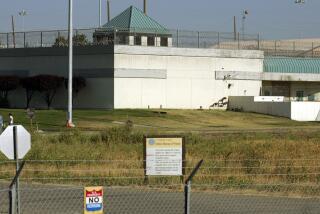Mafia hit man is suspected in former mob boss ‘Whitey’ Bulger’s beating death in prison
Inside the West Virginia prison where James “Whitey” Bulger was beaten to death, there is little shock about his violent demise, apparently at the hands of fellow inmates.
The notorious 89-year-old former Boston mobster, who was serving two consecutive life sentences plus five years for his role in 11 murders, was found unresponsive at 8:20 a.m. Tuesday just hours after he arrived at the prison.
A Mafia hit man identified as Fotios “Freddy” Geas, who is serving a life sentence at the prison for murder, is a suspect in Bulger’s death, the Associated Press reported.
“Am I surprised there’s been another murder? No,” said Richard Heldreth, president of Local 420 of the American Federation of Government Employees, which represents more than 800 employees at the U.S. Penitentiary Hazelton in Bruceton Mills, W.Va. “It wouldn’t surprise me if there was another one tomorrow. We are severely understaffed.”
The U.S. attorney’s office for the Northern District of West Virginia and the FBI are investigating Bulger’s death as a homicide — the third inmate slaying at the Hazelton prison in seven months.
In September, inmate Demario Porter, 27, who was serving a 26-month sentence for a parole violation, was killed in a violent altercation with another inmate. In April, inmate Ian Thorne, 48, who was serving a 20-year sentence for conspiracy to commit murder, was killed in a fight in a housing unit.
Union officials have raised a flurry of concerns over the last year about acute understaffing and lethal violence at the prison, which is categorized as a high-security lockup. There are more than 3,000 inmates at the prison complex.
“We’re short of 42 correctional officers,” Heldreth said, noting that the Hazelton complex is authorized to have 445 correctional officers but only has 403. “It affects the security of the prison.”
Prisons across the nation have dealt with extreme shortfalls in correctional officers since the Trump administration imposed a hiring freeze in January 2017 and the Bureau of Prisons stopped filling vacant positions. At the beginning of this year, the agency eliminated 6,000 positions nationwide, a 14% reduction in staffing levels. The cuts included 127 jobs at Hazelton.
With fewer staff, corrections officers find it harder to control contraband, keep an eye on inmates and respond swiftly to emergencies in the massive facility, said Justin Tarovisky, executive vice president of Local 420 at Hazelton.
In an effort to fill in the gaps, he said, the Bureau of Prisons regularly leans on teachers, secretaries, counselors and other civilian employee with little to no experience to serve as corrections officers. While all prison workers get the same initial basic training, workers who typically work security are more familiar with the inmates and better equipped to anticipate problems.
“Take a teacher, an electrician or a plumber and throw them in there for a day, they’re not familiar with anything,” Heldreth said. “It’s a bad situation as we have to be on our toes working around these guys.”
Staff who responded Tuesday morning began life-saving measures, but Bulger was pronounced dead by the Preston County medical examiner, the Bureau of Prisons said in a statement.
The agency did not say why Bulger was transferred to Hazelton from U.S. Penitentiary Coleman in Sumterville, Fla. Nor did it comment on why Bulger, a high-profile elderly inmate, was allowed to enter the prison’s general population given his long record of violent killings.
“He was sentenced to life in prison, but as a result of decisions by the Federal Bureau of Prisons, that sentence has been changed to the death penalty,” Bulger’s defense attorney, J.W. Carney, said in a statement.
Over the last year, a stream of U.S. congressmen and senators — from both sides of the political aisle — have joined union officials in raising the issue of public safety at the prison.
“Inadequate staffing creates dangerous conditions for our corrections officers and our communities,” said Rep. David B. McKinley (R-W.Va.) after the April slaying at Hazelton. “When our federal prisons have to resort to using nurses or cooks to fulfill the duties of correctional officers, the solution isn’t to cut positions. You need to increase your staffing levels.”
This month, a congresswoman representing the District of Columbia, Eleanor Holmes Norton, urged Justice Department Inspector Gen. Michael Horowitz to open a formal investigation into the “appalling” conditions at Hazelton.
According to Norton, the family of one inmate said he had been “beaten badly by … prison guards to the point they fractured his ribs,” while another reported he was attacked by guards and left in solitary confinement, unable to receive medical attention for days.
Last week, a bipartisan group of five U.S. senators, including Joe Manchin III and Shelley Moore Capito of West Virginia, wrote to Atty. Gen. Jeff Sessions to express “deep concerns” about staffing at the Bureau of Prisons, specifically mentioning the recent homicides at the Hazelton facility.
“This is unacceptable,” they wrote.
UPDATES:
3:40 p.m.: The story was updated with reaction from prison union leaders and politicians.
The story was originally published at 11:10 a.m.
More to Read
Start your day right
Sign up for Essential California for news, features and recommendations from the L.A. Times and beyond in your inbox six days a week.
You may occasionally receive promotional content from the Los Angeles Times.







